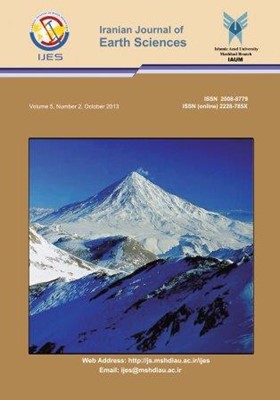Separation of Geochemical Anomalies Using Factor Analysis and Concentration-Number (C-N) Fractal Modeling Based on Stream Sediments Data in Esfordi 1:100000 Sheet, Central Iran
محورهای موضوعی : MineralogyPeyman Afzal 1 , Afshar Zia Zarifi 2 , Behnam Sadeghi 3
1 - Department of Mining Engineering, South Tehran Branch, Islamic Azad University, Tehran, Iran
2 - Department of Mining Engineering, Lahijan Branch, Islamic Azad University, Tehran, Iran
3 - Department of Mining Engineering, South Tehran Branch, Islamic Azad University, Tehran, Iran
کلید واژه: factor analysis, Concentration-Number (C-N) Fractal Model, Esfordi, stream sediment,
چکیده مقاله :
The aim of this study is separation of Fe2O3, TiO2 and V2O5 anomalies in Esfordi 1:100,000 sheet which is located in Bafq district, Central Iran. The analyzed elements of stream sediment samples taken in the area can be classified into 5 groups (factors) by factor analysis. The Concentration–Number (C-N) fractal model was used for delineation of the Fe2O3, TiO2 and V2O5 thresholds. According to the thresholds, the distribution of elemental concentration for Fe2O3 and TiO2 were divided to four lassifications and V2O5 has five geochemical populations in the area. Based on correlation between obtained results with geological and remote sensing data, the results show that the major anomalies of Fe2O3, TiO2 and V2O5 and related factor are mostly situated around granitic/rhyolitic rocks, iron alterations and along faults.
The aim of this study is separation of Fe2O3, TiO2 and V2O5 anomalies in Esfordi 1:100,000 sheet which is located in Bafq district, Central Iran. The analyzed elements of stream sediment samples taken in the area can be classified into 5 groups (factors) by factor analysis. The Concentration–Number (C-N) fractal model was used for delineation of the Fe2O3, TiO2 and V2O5 thresholds. According to the thresholds, the distribution of elemental concentration for Fe2O3 and TiO2 were divided to four lassifications and V2O5 has five geochemical populations in the area. Based on correlation between obtained results with geological and remote sensing data, the results show that the major anomalies of Fe2O3, TiO2 and V2O5 and related factor are mostly situated around granitic/rhyolitic rocks, iron alterations and along faults.


